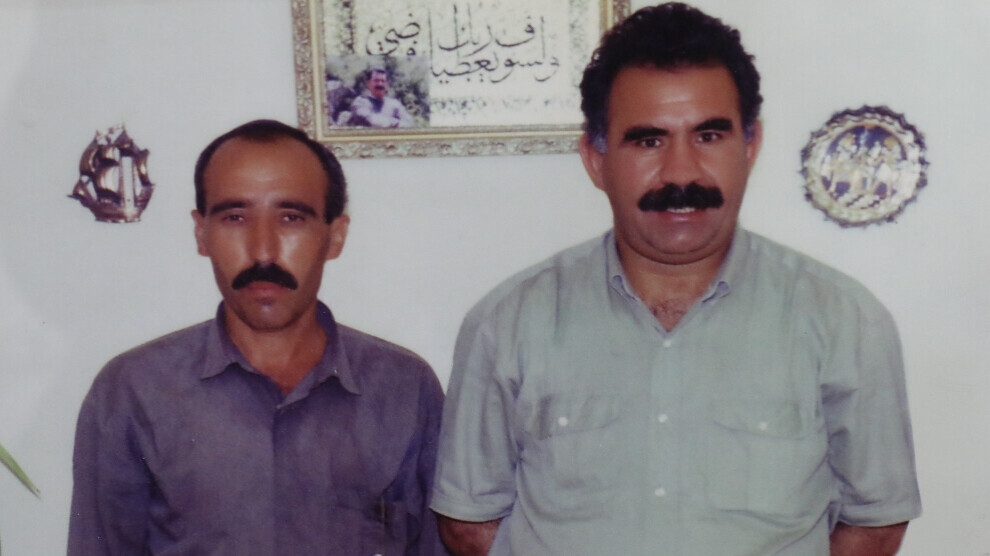Ebdullah: My life changed after I met Öcalan
Mehmud Hecî Ebdullah served as a courier for the PKK in 1987, and the deep connection he established with Abdullah Öcalan between 1991 and 1993 shaped his life.
Mehmud Hecî Ebdullah served as a courier for the PKK in 1987, and the deep connection he established with Abdullah Öcalan between 1991 and 1993 shaped his life.

The Kurdish freedom struggle has been shaped by the sacrifices of countless heroes and millions of Kurdish mothers and fathers whose hearts beat with hope. They have endured every hardship for the future of their children and the freedom of their people. In this epic struggle, Mehmud Hecî Ebdullah, a former courier for the PKK, holds a significant place.
Ebdullah was born and raised in 1960 in the village of Rihanikê in Dêrîk (Rojava). His deep connection to his land and the yearning for freedom that took root in his childhood led him to become a courier for the PKK in 1987, a decision that marked a turning point in his life. In 1991 and 1993, he had the opportunity to meet and engage in dialogue with Abdullah Öcalan. From that moment on, he dedicated himself to living by Öcalan's philosophy. The thoughts and ideology of Öcalan burned like a torch in Ebdullah’s heart, inspiring him to tirelessly work and struggle for the freedom of the Kurdish people. As the brother of martyr Dijwar Dêrîk, who was killed in 1987, he took over his sibling's legacy and devoted his life to the Kurdish people's freedom struggle.
Stunned to see Öcalan at the door
Ebdullah recalls the moment he first saw Öcalan in 1991, describing his surprise and deep emotions: “We had traveled to Damascus because of my mother’s health issues. Before leaving, we had informed our friends, and one of them had given us a note to facilitate our stay in the city. When we arrived in the Rukneddin neighborhood, we were unable to reach the people we were supposed to stay with. I asked a relative of theirs who happened to be in the street, and he told me that the night before, Baath regime security forces had raided the house and arrested them. This unexpected situation disrupted our plans. The person who informed us of the arrests took us to another house, where we delivered the note from our friend. After reading it, they led us to a different location in the Zahira district of Damascus. We climbed to the third floor, and as the person accompanying us knocked on the door, Mr. Öcalan opened it. I was stunned. Öcalan had great respect for my brother, martyr Dijwar. After reading the note, the friend who had received it explained the situation to him, mentioning that Dijwar’s mother was ill. Upon hearing this, Öcalan expressed his wish to meet us. He greeted my mother by kissing her hand. Since he had guests at the time, he asked us to wait and led us to another room.”
Öcalan sent my mother to his personal doctor
After his guests left, Öcalan spoke at length about martyr Dijwar, his passion for culture and art, and his deep connection to his land and language. Then, we shared a meal together.
He personally served food to my mother and insisted that I drink ayran. He showed great care and attention. When he stood up from the table to wash his hands, he returned carrying tea for us. I was deeply moved by this gesture. After all, we called him "Leader" and "President" and it felt unusual to see a leader serving tea himself. Then, he turned to the friend who had brought us and said, "The mother must be tired, take her to rest. And tomorrow, make sure she sees the doctor I go to." Finally, he took a photo with my mother and me before seeing us to the door.
The second meeting: A connection beyond time
Recalling his second meeting with Öcalan in 1993, Ebdullah described those days with deep affection: “At that time, the leaders and coordinators of courier operations were Ahmet Hemze and Zinar Reşît. Along with patriotic friends Ebu Bêro and Selîm, we carried out courier activities. I had already begun working as a courier in 1987. Occasionally, I traveled with Ahmet and Zinar, while at other times, Ebu Bêro would scout alone. These reconnaissance missions, which we conducted to ensure the safe passage of groups, had become more frequent. Later, in 1989, Ahmet, Zinar, and Mihyedîn fell martyrs. However, our courier operations remained active.
After the spontaneous meeting in 1991, Selim and I attended a meeting led by Öcalan in 1993. Even though two years had passed since our first meeting, he had not forgotten me. The first thing he asked about was my mother’s health. He was already aware that we were couriers and inquired about how our work was going. We had brought him a map and explained the routes in detail. After an extensive briefing, he asked about the people of Dêrîk and their level of involvement in the struggle. That second meeting allowed me to understand Mr. Öcalan much more deeply."